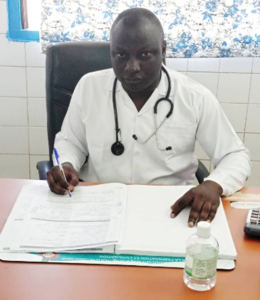USAID MTaPS Supports Côte d’Ivoire to Improve the Quality of Care by Revitalizing Drug and Therapeutics Committees
Dr. Kossounou Meisan is a pediatrician at the Regional Hospital Center of Gagnoa. Like many health professionals, he is facing an alarming reality: antimicrobial resistance (AMR). He shares: “AMR is a reality within the hospital of Gagnoa, with certain medicines being prescribed excessively, including two drugs prescribed for bacteriological infections, ceftriaxone and cefixime, without any microbiological samples taken from patients.”
As mentioned by Dr. Kossounou, the overconsumption and misconsumption of antimicrobials contribute to AMR, as germs get used to the antimicrobial treatments, which can lead to new multiresistant pathogens: “The awareness and training regarding antimicrobial stewardship are insufficient, with sometimes motivational issues.”

Entrance of the Regional Hospital Center of Gagnoa. Photo credit: Fernique Konan, GTT-RAM Secretary.
AMR can lead to dramatic consequences for the health and life of patients. Without efficient antibiotics that combat the infections they are meant to treat, patients can’t fight the diseases that they suffer from.
USAID, through its Medicines, Technologies, and Pharmaceutical Services (MTaPS) Program, supported the Ministry of Health, Public Hygiene, and Universal Health Coverage to strengthen the capacities of health agents to improve antimicrobial prescription. The program focused on revitalizing drug and therapeutics committees (DTCs), institutional groups that aim to improve accessibility, availability, and use of antimicrobials; Dr. Kossounou is a member of the DTC at the Regional Hospital Center of Gagnoa.

Dr. Kossounou Meisan in the pediatrics unit. Photo credit: Fernique Konan.
In the Regional Hospital Center of Gagnoa, a baseline assessment on the functionality and capacities of the DTC showed a score of 25/55 in January 2022 and highlighted gaps, including the absence of an action plan for the DTC, a lack of monitoring for prescriptions and usage of antimicrobials, and a lack of awareness on antimicrobial stewardship.
Following this assessment, DTC members were trained on antimicrobial stewardship. These training sessions included themes such as the functioning of a DTC, AMR and the rational use of antimicrobials, and activities to foster better antimicrobial stewardship. In addition, a plan for continuous quality improvement for the use of antimicrobials was implemented in the pediatrics unit of the hospital, a plan which included an audit on antimicrobial prescription.
“The training for prescribers on the rational use of antimicrobials, the development of a policy to regulate the promotional activities of medical delegates, and providing awareness to prescribers on antimicrobial best practices were significant improvements that were noted.” says Dr. Kossounou.
These efforts have led to important results. The score increased from 25/55 in January 2022 to 41/55 in November 2022 and 48/55 in July 2023, making the Regional Hospital Center of Gagnoa one of the centers of excellence in the fight against AMR. Dr. Kossounou shares the feeling of a number of health agents: “USAID MTaPS’ capacity-strengthening work has helped the DTC to be revitalized and to better grasp antimicrobial stewardship activities. The plan was developed to provide continuous quality improvement to fix the gaps observed in the use of antimicrobials in our facility. In spite of remaining challenges, the DTC is committed to improve the quality of care by better using antimicrobials.”
Following this first prescription audit implemented in the pediatrics unit, the DTC plans on expanding it to other services of the hospital to eventually provide a global improvement of antimicrobial prescription that will contribute to improving the quality of care in this hospital.